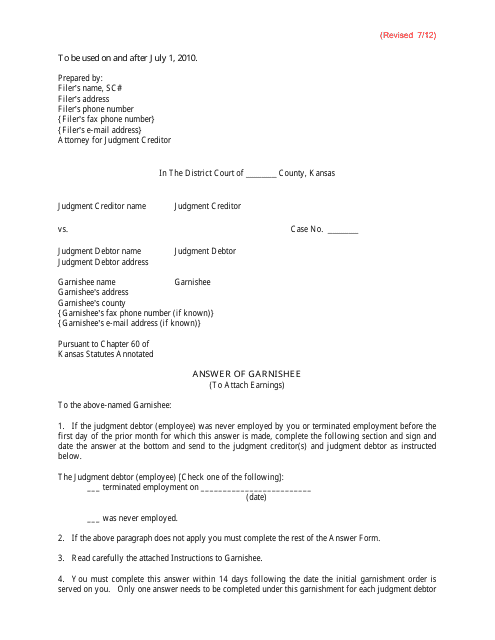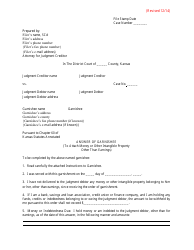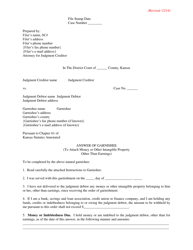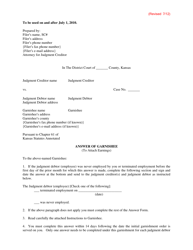Answer of Garnishee (To Attach Earnings) - Kansas
Answer of Garnishee (To Attach Earnings) is a legal document that was released by the Kansas District Courts - a government authority operating within Kansas.
FAQ
Q: What is a garnishee?
A: A garnishee is a legal order that allows a creditor to collect money from a debtor's wages or bank account to satisfy a debt.
Q: What is a garnishment?
A: A garnishment is the legal process of collecting money from a garnishee.
Q: What are earnings?
A: Earnings refer to money earned through employment, including wages, salaries, commissions, and bonuses.
Q: Can my wages be garnished in Kansas?
A: Yes, Kansas allows creditors to garnish a debtor's earnings to satisfy a debt.
Q: How much of my earnings can be garnished in Kansas?
A: In Kansas, the maximum amount that can be garnished is usually 25% of your disposable earnings, or the amount by which your earnings exceed 30 times the federal minimum wage, whichever is less.
Q: Can I stop a garnishment in Kansas?
A: There may be options to stop or reduce a garnishment in Kansas, such as negotiating a payment arrangement with the creditor or filing for bankruptcy. It is recommended to seek legal advice for individual circumstances.
Q: What should I do if my wages are being garnished in Kansas?
A: If your wages are being garnished in Kansas, you should consult with an attorney to understand your rights and options.
Q: Can a creditor garnish my bank account in Kansas?
A: Yes, in Kansas, a creditor can also garnish a debtor's bank account to satisfy a debt.
Q: Can a garnishment impact my credit score?
A: No, a garnishment itself does not directly impact your credit score. However, the underlying debt that resulted in the garnishment may affect your credit.
Q: Is there a time limit on how long a garnishment can last in Kansas?
A: In Kansas, a garnishment can last until the debt is fully satisfied, unless the garnishment is stopped or a payment arrangement is made with the creditor.
Form Details:
- Released on July 1, 2012;
- The latest edition currently provided by the Kansas District Courts;
- Ready to use and print;
- Easy to customize;
- Compatible with most PDF-viewing applications;
- Fill out the form in our online filing application.
Download a printable version of the form by clicking the link below or browse more documents and templates provided by the Kansas District Courts.









